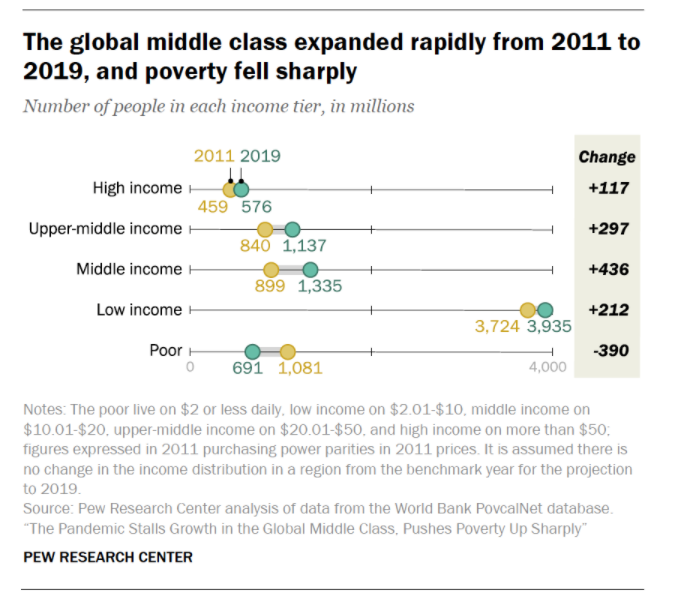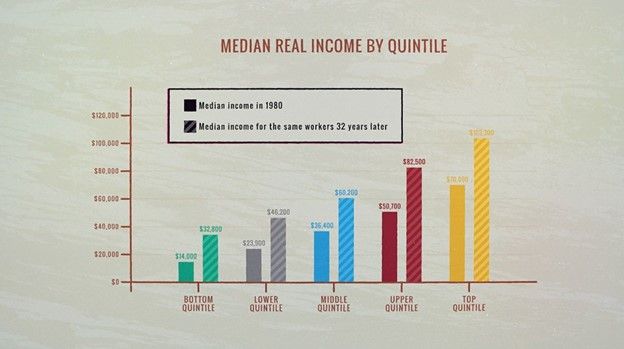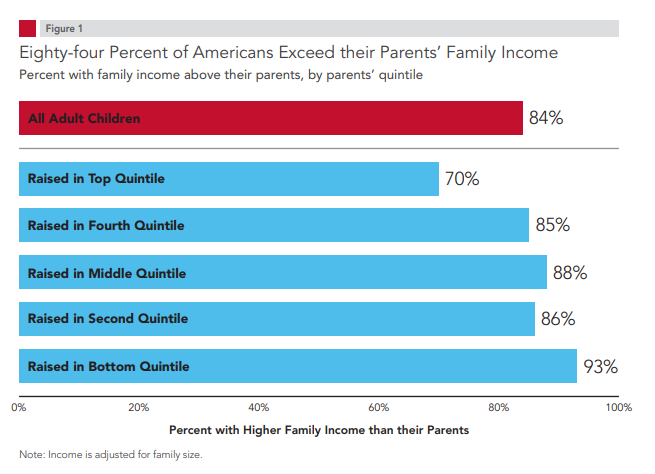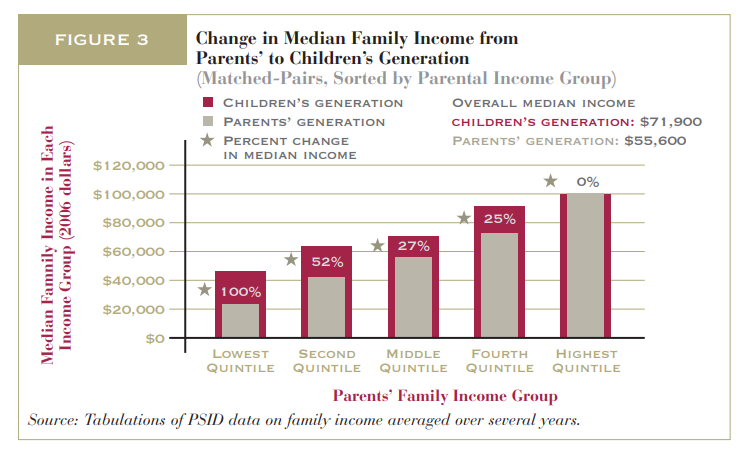The Poor Are Getting Richer—Along with Most Everyone Else
God cares about the poor. And we should too.
“I know that the Lord will maintain the cause of the afflicted and justice for the poor,” David wrote in Psalm 140—just one of numerous examples from the Bible of God's concern for the poor.
The good news is, contrary to popular belief, the poor today have consistently been getting richer. In the United States, the United Kingdom, the European Union and other developed countries. In emerging economies. And in countries with extreme poverty.
This is my third post in a series on positive cultural trends. (Here are the first and second posts in this series.) My goals are to cheer up my fellow Christians, too many of whom have become overly pessimistic in recent years, and to remind all of us that Jesus the King is still acting within our cultures to bless us and glorify Him.
Today, I’m going to tackle the thorny issue of income stagnation, often discussed through the lens of income inequality. Some readers may wonder why they should even care about purely materialistic things like income. After all, didn’t Paul say, “the love of money is the root of all kinds of evils” (1 Tim. 6:10). And some readers may question why we should focus on income inequality, a problem nearly as old as human history. Didn’t Jesus himself say that “The poor you will always have with you” (Matt. 26:11) and “Blessed are you who are poor” (Luke 6:20)?
But God created the whole world—including the material parts of it. And as my friend D.C. Innes pointed out in the book Left, Right & Christ, just as God didn’t create us to be sick, He also didn’t create us to be poor. Both sickness and poverty are consequences of the brokenness of our world. And we as Christians should be active trying to alleviate both.
It’s hard to overstate the political importance of income inequality. In the U.S., angst over middle-class income stagnation was a major driver behind Donald Trump’s “Make America Great Again” theme. The issue is also driving current President Joe Biden’s economic proposals, as he has proposed raising taxes on the wealthiest in America in order to fund government programs to create for lower-income Americans that are struggling.
Globally, income inequality is a frequent topic at the United Nations and the Organisation for Economic Cooperation and Development. Many want to ensure that the rapid economic growth in such countries as China and India is “inclusive growth” that lifts people at all income levels.
“Inclusive growth” is, indeed, what we want. What gets less attention, however, is that it’s, indeed, what we’re getting.
Poverty is declining
Let’s start with extreme poverty—commonly defined as a person on less than $1.90 in U.S. dollars per day. In 1990, 36 percent of the world’s population lived in extreme poverty (adjusted for inflation). By 2017, it was less than 10 percent. That’s still a big problem—afflicting nearly 700 million people worldwide. But it also means more than 1.2 billion people who were in extreme poverty in 1990, no longer are.
As extreme poverty declines, the global middle-class has grown rapidly—right up until the disruption of the COVID-19 pandemic. The chart below from the Pew Research Center shows those gains clearly. Hopefully, as the pandemic recedes, these gains will resume.

Even the poor and working class in high-income countries have consistently grown wealthier. This chart shows that in nearly every country—in Europe, North America and Australia—incomes after taxes have risen in recent decades for households in the lowest 10 percent. The only exceptions are Iceland and Hungary. Incomes have also risen for nearly all other income levels in nearly all other countries as well. (All figures in this chart are adjusted for inflation, allowing for accurate comparison over time.)
Disposable income growth among the bottom 10 percent in the United States appears small in this chart—only 2.17 percent from 1979 to 2013. And this has been the source of significant controversy.
U.S. incomes are growing broadly
The trouble with this conclusion is that it assumes the people with the lowest incomes always stay in that category. But when that assumption is actually examined, it proves untrue. Several studies have looked at workers over time and found that, at all income levels, their earnings have risen considerably.
Yonatan Berman, a researcher at the Stone Center on Socio-Economic Inequality, calculated earnings of U.S. workers, aged 25 to 30, at all income levels in 1980. Then he calculated their earnings near the end of their working careers, in 2012. At every income level, from high to low, incomes rose significantly over a person’s life. For those in the bottom 20%, they more than doubled. (See chart below.)

Another way to look at this is to see if kids earn more than their parents. Another Pew study, which compared tax returns across two generations, found that the vast majority of kids—especially at the lowest income levels—earn more than their parents.

How much more do they earn? That was answered by a similar generational analysis by the Brookings Institution. It found that Americans who grew up the poorest earn, on average, twice as much as their parents did.

None of this to say that poverty is solved or that individual people don’t face huge financial problems or that some communities and entire countries aren’t struggling economically. It doesn’t mean income inequality isn’t something we should work to alleviate. But I think these data do show that our economic systems, for all their many flaws, are presenting better opportunities and distributing greater benefits, including to those who are poor. These data show that it’s not the case, as often claimed, that the rich are getting richer while the poor are getting poorer. And if that’s not the case, then the common solution to that problem—tax the rich more and redistribute more income to the poor—is probably not the fix we need.
So what should we do? Help people at the community level. One of the most sophisticated and celebrated studies of generational income mobility in the U.S. found that communities with less income inequality were somewhat better at helping kids exceed their parents’ incomes than communities with more income differences. But according to the study’s authors, a team of economists led by Raj Chetty and Nathanial Hendren, what made even bigger differences were less neighborhood segregation by income and race, less violent crime, better schools and more two-parent families.
Stronger families and schools, safer and more welcoming neighborhoods—these are things Christians can, should and do work for every day. To the extent these things are happening, they’re making a difference in lifting the poor out of poverty. We should keep it up.
